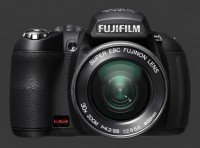Fujifilm Finepix HS20 EXR Review
Fujifilm Finepix HS20 EXR Usability - How easy is it to use?
NOTE The HS20 EXR is extremely similar externally to the HS10. Except for the assignment of the Up button, the controls are identical. Most of this review page is therefore taken from the Fuji Finepix HS10 review.
The basic camera operation of the Fuji Finepix HS20 EXR is strait forward. Although the number of buttons is high, advanced users appreciate having external controls for all commonly used features. The deep contoured grip provides a secure hold on the camera and is mostly comfortable.

The HS20 EXR is powered on by a rotating switch which surrounds the shutter release. It feels solid and has two well-defined positions with audible clicks. Every other button feels just as solid. This digital camera has an aggressive auto-sleep feature which turns the camera off after a period of inactivity. Unfortunately, waking the camera up requires moving the power-switch to the Off position and back to On. This makes it slower to wake up than most cameras which are woken up by a half-press of the shutter-release.
A pleasure of few digital cameras is a mechanical zoom lens. Fuji has equipped the HS20 EXR with a zoom ring which turns smoothly. Its small size and the position of the flash means that one has to be careful when turning to not bump against flash-housing. Regardless, this is infinitely better than not having a zoom ring.
Having a mechanical zoom ring means that zooming from 24 mm to 720 mm can be done in ½s and there are no zoom steps. There is also a fly-by-wire focus ring which also turns smoothly. The focus ring is responsive and sensitive enough.
The shutter release is pretty standard with a short travel distance. The two buttons behind the shutter, exposure compensation and drive mode are unfortunately indistinct and too far for comfort. Behind those are the mode-dial and top-mounted control-wheel. Both dials rotate easily and have gentle click-stops to avoid accidental changes. They are also set on a slant for easy reach using the thumb.
Pressing the exposure-compensation button, shows a luminance histogram which is updated in real time as exposure is changed. Unfortunately the HS20 EXR screws up big-time here, something that the S100FS actually got right. The histogram is actually that of the display. Now, if this digital camera was exposure-priority all the time, it would not be a problem. However, the HS20 EXR does not always show the correct exposure before the shutter is pressed halfway, so the preview histogram while using EC can be significantly off. This problem should be correctable via a firmware update.


The camera rear is dominated by a large 3" LCD with 460K pixels, twice as many as the HS10, mounted using a double-hinge for framing flexibility. The hinge seems solid enough that this is not much of a liability problem. Above it is a tiny EVF with an Eye-Start Sensor which switches between the LCD and EVF automatically. Once used to one of these, it is hard to accept anything else. The EVF is not so precise but easy to see and keeps up well. A switch next to the EVF allows to manually switch between the two display.
 To the left of the LCD is a column of buttons to be used in conjunction with the control-wheel. All these functions require two handed operation, therefore letting go of the zoom ring. Unfortunately ISO is among those buttons, it could have been switched with drive mode which is not used as often in general. The remaining buttons are: AE, AF mode, AF drive and WB.
To the left of the LCD is a column of buttons to be used in conjunction with the control-wheel. All these functions require two handed operation, therefore letting go of the zoom ring. Unfortunately ISO is among those buttons, it could have been switched with drive mode which is not used as often in general. The remaining buttons are: AE, AF mode, AF drive and WB.
When pressed, the ISO button shows the list of possible ISO values and Auto settings for the current mode. The available ISO values can go from 100 to 12800 while Auto settings specify a maximum ISO sensitivity between 400 and 3200. Resolution and dynamic range are automatically adjusted for the chosen ISO when the current setting is incompatible. Note that neither fixed nor Auto ISO settings are available in all modes.
The AE button selects the metering mode. It is possible to do so in Program, Aperture Priority, Shutter-Priority, Manual, EXR-HR, EXR-DR and EXR-SN modes. Scene modes and Auto EXR always use multi-segment metering. In Manual mode, the metering option is used to display an exposure-meter at the lower-right corner of the displays. There are no steps to the exposure-meter but a plus or minus next to it turns yellow when the set exposure differs from the metered one.
The AF button is for the autofocus point-selection. There are 4 options available in some modes: Center, Multi, Area and Tracking. Selecting Area lets the photographer choose between 49 AF areas. To change the area, simply press the AF button again and use the arrows to move it around. The AF C-S-M button selects between AF-S, AF-C and MF focus modes.
The WB button is for choosing white-balance. In the case of custom white-balance, the user can immediately set it by pressing the shutter-release or reuse the measured temperature by pressing the OK button. While-balance fine-tuning is not available here, instead the menu must be used.
The rear of the camera also has a Record button, an AE-L button, a Display button, a Playback button and a 4-way controller with central OK/Menu button. The Record button starts and stops video recording. Movie recording starts one second after the Record button is pressed. One thing that Fuji did well is include a display mode which shows the HD 16:9 aspect-ratio framing.
 The 4-way controller has a center button to activate the menu system and select menu options. The menu system is easy to navigate and most options are quite intuitive. The menu is divided into 2 main tabs. The camera menu is then divided into 4 pages and the setup menu into 6.
The 4-way controller has a center button to activate the menu system and select menu options. The menu system is easy to navigate and most options are quite intuitive. The menu is divided into 2 main tabs. The camera menu is then divided into 4 pages and the setup menu into 6.
Each direction of the 4-way controller is also assigned a function in shooting mode. To the right, the flash mode can be set, but only when the flash is up. The choices available are Auto, Forced and Slow-Synchro. Down selects a 2s, 10s or Face-Detect self-timer. Each time the 2s or 10s self-timer is used, it resets itself. While the new Face-Timer seems like a good idea and the implementation does an excellent job at detecting faces, it operates so quickly that there is no time to frame properly or for the subject to get prepared for the shot. Left activates Macro or Super-Macro mode. Up activates toggles RAW capture.
There is an off-center tripod mount at the bottom of the Fuji Finepix HS20 EXR. It is not aligned with the center of the lens which is problematic for panoramas. There are separate doors for the battery and memory-card compartments. While shooting from a tripod, one can change memory cards but not batteries. Speaking of batteries, this camera accepts a number of different types including Lithium, NiMh and Alkaline, as long as they come in AAs.
 |
Please Support Neocamera
All information on Neocamera is provided free of charge yet running this website is a huge endeavor. Purchases made via affiliate links found throughout the site help keep it running and up-to-date. There is no additional cost to you, so please consider buying via these links to our affilates:
If you found any information on this site valuable and did not purchase via our affiliate links, please considering donating via PayPal:
Any amount will be greatly appreaciated. Thank you for your support!
Fujifilm HS20 EXR Highlights

Sensor-Size: 6 x 5mm

Actual size when viewed at 100 DPI
| 16 Megapixels Ultra Zoom | ISO 100-3200 |
| 30X Mechanically Linked Ultra-Wide Optical Zoom | Shutter 1/4000-30s |
| Built-in Stabilization | Full manual controls, including Manual Focus |
| 0.20" Built-in EVF 200K Pixels | Custom white-balance |
| Automatic Eye-Start sensor | Spot-Metering |
| 1 Axis Digital Level | Hot-Shoe |
| 8 FPS Drive, 8 Images | Standard AA Battery |
| 1920x1080 @ 30 FPS Video Recording | Secure Digital Extended Capacity |
| 3" LCD 460K Pixels |
Updates
2025.01.18

Fujifilm GFX 2025 Lens Roundup
Lens Review roundup of Fujifilm GFX Medium-Format lenses. Quality, performance and handling of the GF20-35mm F/4R WR, GF30mm F/3.5 Tilt-Shift and the GF55mm F/1.7.
2024.11.18

Best 2024 Photography Gifts for Every Budget
Great gifts for photographers and photo enthusiasts selected for every budget among the best products of 2024.
2024.08.07

Eye Protection Tips for Professional Photographers
The four main considerations for professional photographers regarding eyewear.
2024.07.14

Fujifilm X100VI Review
Flagship fixed-lens compact digital camera with a 40 MP sensor and Image-Stabilization, a first for the series. Retro design featuring dual control-dials, plus direct ISO, Shutter-Speed and EC dials. Its hybrid viewfinder can switch between EVF and OVF mode.
2024.05.09

Fujifilm GFX100 II Review
Flagship 102 Megapixels Medium-Format Mirrorless Digital Camera with 8-Stop 5-Axis IBIS, 8 FPS Drive, 8K Video and 400 MP Super-Resolution capture in a weatherproof and freezeproof body with dual control-dials and dual memory-card slots.
2024.04.03

Fujifilm X-T5 Review
Newest Fujifilm flagship boasting a 40 MP APS-C sensor, 5-axis IBIS with 7-stop efficiency, 15 FPS continuous drive, 6.2K Video capture, dual control-dials and dual SDXC UHS-II slots in a sturdy weatherproof and freezeproof body.
2023.11.20

Best Digital Cameras of 2023
Find out which are the Best Digital Cameras of 2023. All the new Mirrorless Digital Cameras from entry-level to high-end professional.
2023.07.10

Fujifilm X-H2 Review
40 Megapixels APS-C Hybrid Mirrorless Digital Camera with 7-stop IBIS. Fastest shutter ever and 8K video capture. Large builtin EVF with 0.8X magnification and 5.8 MP, plus an Eye-Start Sensor. Packed with features and large number of controls in a weatherproof and freezeproof body.
2023.05.07

Sony FE 20-70mm F/4G Review
Review of the unique Sony FE 20-70mm F/4G lens. The optical zoom of this lens spans ultra-wide-angle and medium focal-length coverage, making it one of the most versatile Full-Frame lenses on the market.
2023.01.15

Huion Inspiroy Dial 2 Review
Review of the Huion Inspiroy Dial 2 tablet, a medium sized drawing surface with dual dials and customizable buttons. Connects via USB-C or Bluetooth 5.0 with Windows, Linux and Android support.
2022.12.08

How to Pack for a Photo Trip
Find out how to pack for a travel photography trip, carry your gear safely while meeting airline regulations.
2022.11.13

Best Digital Cameras of 2022
The best digital cameras of 2022. A short list of the most outstanding models in their respective categories. Choose one for yourself or as a gift.












